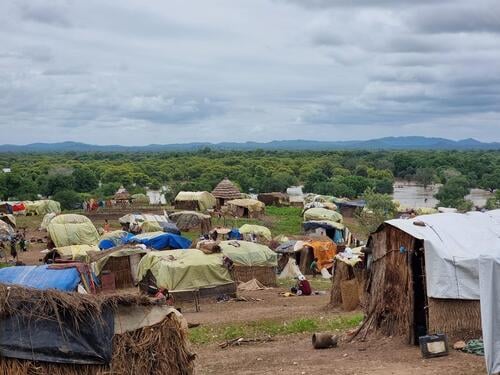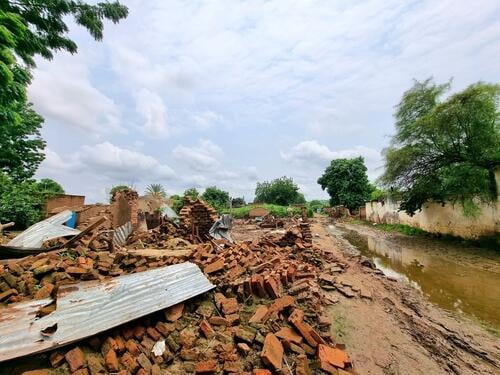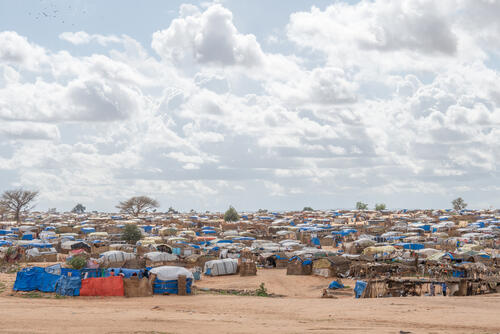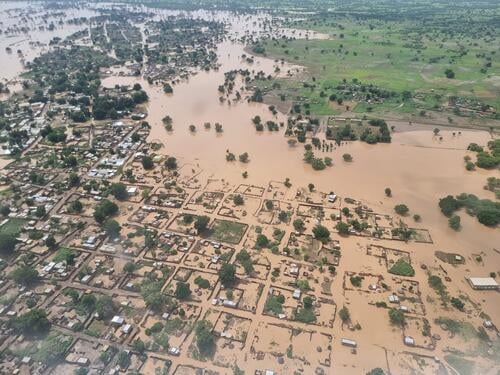The situation in Koukou Angarana, Sila province, Chad, and the surrounding area, remains critical after devastating floods on 9 August. The floods displaced thousands of people, destroyed homes and left health centres unable to function. The likelihood of another major flood is decreasing, but the needs left from 9 August are not.
Urgent needs not being met
Forced from their homes because of the floodwaters, people have now set up sites where food, water and sanitation services, shelter reinforcement, and access to healthcare, are their urgent needs.
“The living conditions of displaced people in Koukou are extremely difficult,” says Julie Melichar, project coordinator. “They are exposed to risks of epidemics given the lack of drinking water, people living on top of one another in the camps, and the absence of health facilities.”
People are living in makeshift shelters. There are very few blankets, including for young children and pregnant women. The tarpaulins used for tents are insufficient and often in poor condition. With repeated rains and storms, the lack of physical protection promotes the development of diseases like acute respiratory infections and malaria.
Médecins Sans Frontières (MSF) has set up a health post where we provide basic healthcare. Between 14 August and 9 September, we carried out 1,850 health consultations. Over 340 people had acute respiratory tract infections, 265 tested positive for malaria, and more than 220 were treated for diarrhoea. Our team also provided antenatal consultations to 232 pregnant women.
Access to clean drinking water is almost non-existent in Koukou. The quality of the water at the few functional sources needs to be assessed, and the quantity available does not cover the number of people in the displacement sites.
“Water sources were contaminated during floods by a mixture of sewage and waste, including faeces,” says Melichar. “Water is not always available, pushing people to use water from wadis [rivers]. Although MSF is cleaning water wells, they are at risk of being contaminated again in the event of further rains or flooding. The situation remains precarious and requires an effective water, sanitation and hygiene response to reduce the risk of communicable disease outbreaks.”
Food and international response lacking
Food is another concern. The floods destroyed much of the food supply and made essential activities, like collecting firewood and working in the fields, impossible. Many fields of sorghum, groundnuts and millet have been destroyed or are no longer suitable for cultivation. Food prices have also skyrocketed- so what little is available is unaffordable.
MSF teams have heard from people that hunger is their immediate concern. The number of people affected means they require huge support. Yet, one month after the floods, many have received nothing as an adequate response from international organisations has not materialised.
“An immediate food distribution would significantly help many people here,” says Melichar. “This would be a crucial, and much needed, first step, but despite these floods happening a month ago there has been very little in terms of international response. People can’t wait much longer.”

Concerns for people outside Koukou
The government announced, as of 3 September 2024, that a total of nearly 1.5 million people are affected by floods countrywide, with nearly 260,000 hectares of fields destroyed in 115 departments out of the 120 in the country.
With roads being largely impassable due to flooding, information about affected villages on both sides of the Wadi Bahr Azoum [river] in Sila province is beginning to trickle in. They describe many flooded villages, destroyed fields, and people who have been displaced multiple times. Reaching these people is a logistical challenge and a rapid response from other organisations is essential to meet the most urgent needs of people, in particular to provide medical care.






